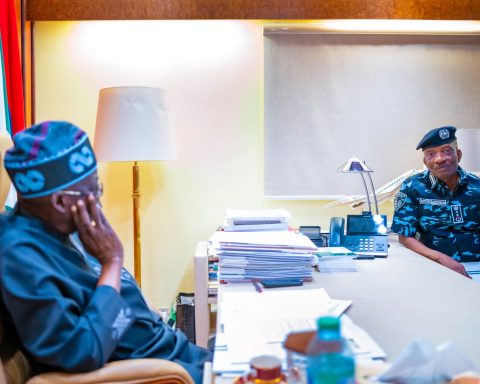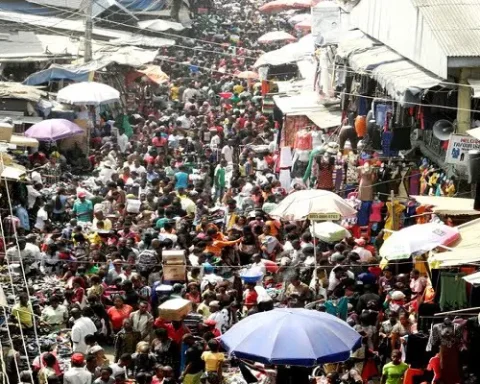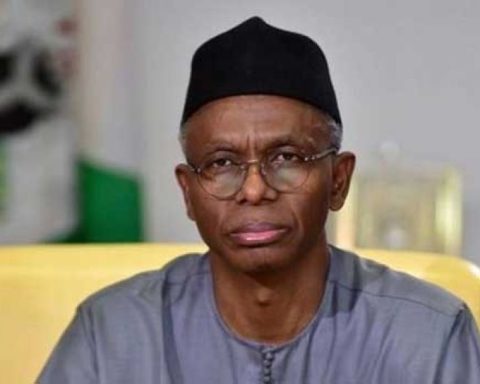A few days ago, Nigeria and Brazil signed a $1 billion agreement at the State House in Abuja, aiming to transform Nigeria’s agricultural sector through the Green Imperative initiative.
The deal, formalised during the 2nd Nigeria–Brazil Strategic Dialogue Mechanism, was led by Vice President Kashim Shettima and his Brazilian counterpart, Geraldo Alckmin.
Join our WhatsApp ChannelThe vice president called the partnership a “shared dream between two major democracies committed to practical outcomes and mutual prosperity,” highlighting that Brazil and Nigeria are “not bound by geography, but by a shared dream” and “the right to dream and the ability to build.”
This agreement arrives as the Tinubu-Shettima administration continues to battle widespread hunger and food insecurity, a challenge that has persisted despite various interventions and the government’s declaration of a state of emergency on food security on 13 July 2023, in response to rising food prices and widespread hunger across Nigeria.
According to a joint statement by the Food and Agriculture Organisation (FAO), the United Nations Children’s Fund (UNICEF), and the World Food Programme (WFP), an estimated 33.1 million Nigerians are projected to face acute food insecurity during the June to August 2025 lean season.
This marks an alarming increase of about 7 million people compared to the same period in 2024. Of this number, the report warns that approximately 5.4 million children and nearly 800,000 pregnant and breastfeeding women are at serious risk of acute malnutrition. Notably, 1.8 million children are expected to suffer from severe acute malnutrition and will require urgent treatment to survive. It is not just a paper report; any person in Nigeria can attest to this hunger.
Since taking office in 2023, the government has launched several other programmes, including the Renewed Hope Agricultural Mechanisation Programme, which the administration through media report deployed 2,000 tractors nationwide, and earlier interventions such as the declaration of a state of emergency on food security, large-scale fertiliser distribution, and the establishment of funds for agricultural development.
Earlier in 2025, Nigeria and Brazil signed the commercial phase of the $1.1 billion Green Imperative Project. The administration has also launched other bilateral and multilateral agricultural initiatives, making the newly signed $1 billion deal a continuation and expansion of ongoing efforts rather than the first such partnership.
The new Nigeria-Brazil agreement builds on these ongoing efforts to modernise and scale up Nigeria’s agriculture sector. Interestingly, Shettima told his Brazilian counterpart during the agreement that reforms embarked upon by President Bola Tinubu have helped reshape Nigeria’s economy, yet hunger persists.
In the new agreement, it is believed that Nigeria stands to benefit from the agreement through access to over $1 billion in mechanised farming equipment, training, and the establishment of agricultural service centres, which will help modernise its agriculture, create jobs, and boost food security. This is expected to reduce reliance on food imports and support long-term economic growth.
Brazil, on the other hand, will benefit by expanding its agricultural technology exports, strengthening economic and diplomatic ties with Africa’s largest economy, and enhancing its global influence as a development partner, but there remain other ambiguous aspects of the agreement.
Unclear aspects of the agreement and likely challenges
Although Vice President Shettima acknowledged land access as a critical challenge for Nigerian farmers during the Nigeria-Brazil agricultural agreement signing, he did not point out the root cause: ongoing conflict between Fulani herders and local farmers, which has made it difficult for farmers to access their lands, especially in key food-producing states like Benue.
The agreement also remains vague on how mechanised equipment will be allocated, the selection process for beneficiary communities, and transparency in funding. There is little detail on measures to address corruption or ensure local stakeholder involvement.
The implementation of the Nigeria-Brazil $1 billion agricultural agreement faces several likely challenges. Nigeria’s persistent political and economic instability could threaten continuity, as frequent policy shifts and leadership changes often disrupt long-term projects.
How about the real risk that future administrations may not prioritise or could even discontinue the initiative, especially if political interests change or if the project fails to deliver immediate, visible results? The aforementioned and many more are what the signed agreement would have clarified.
Evidence of Nigerians’ unseriousness with agriculture
According to media reports, the government claims to have arrested several suspects linked to recent attacks in Benue and the South East. For example, in Benue, police announced the arrest of 26 persons suspected to be masterminds of the Yelwata killings, while 42 armed herders and local bandits have also been detained in various communities, with about 20 remanded and awaiting trial. Which courts were they remanded to?
READ ALSO: Benue Massacre: Silence Is Complicity, Nigeria Cries Out For Justice
In Enugu, two suspected informants, including Matthew Ebeh, were arrested for aiding herders during deadly assaults on farm settlements. Additionally, three suspected herders were arrested in Otobi, Benue, after an attack that left 11 dead.
READ ALSO: Benue Killings: Traditional Ruler Decries Politicisation Of Crisis, Urges Tinubu To Restore Peace
Maybe the authorities did not deem it fit to disclose who sent these suspects or the identities of the masterminds behind the violence. Amidst these arrests, rights groups and legal experts note that meaningful prosecutions are rare, with most attackers still evading justice.
For instance, human rights lawyer, Mr Femi Falana (SAN), said that similar arrests in the past never led to any tangible legal action or convictions. Falana recalled that on 30 December 2024, the Benue State Commissioner of Police, Hassan Yabanet, confirmed the arrest of 273 criminal suspects, with 20 firearms and 51 rounds of ammunition recovered. Yet, there has been no record of prosecution or trials for those arrested. This further highlighted the unseriousness of government efforts.
More concern that shows the country’s unseriousness is that Nigeria has vast agricultural potential, with over 70 million hectares of arable land. So, what has been the use of these lands, only for cow ranching? The 2025 federal budget allocates just 1.28% to agriculture, far below the 10% Maputo Declaration target, and actual spending has declined in real terms due to inflation.
Nigeria scores just 3.4/10 and is “not on track” for the African Union’s Malabo Declaration on agricultural transformation, with only 2.2% of public expenditure going to agriculture and negative growth in agricultural value added per arable land. Nigeria, the so-called giant of Africa, has more arable land than several African countries combined, but remains one of the world’s most food-insecure nations.
Countries like Brazil, India, and Vietnam have rapidly modernised agriculture, investing in technology, research, and infrastructure, turning themselves into major food exporters. Brazil, once poorer than Nigeria, now leads global soybean and beef exports. Uganda and Senegal are achieving strong agricultural-driven GDP growth. In contrast, Nigeria, with over 70 million hectares of arable land, cultivates less than 10%.
What the Nigerian government must do
Before entering into major agricultural agreements, Nigeria must first address insecurity in farming areas, update and enforce agricultural laws, and ensure transparent, accountable institutions. Strengthening farmer cooperatives, investing in research and extension services, and aligning policies with international standards like the Nigerian Agricultural Commodity Standards Grading Policy are also crucial. These steps will create a stable environment for investment and ensure agreements deliver real benefits.
By tackling these foundational issues, Nigeria can maximise the value of such partnerships, gaining access to technology, finance, and global markets, reducing post-harvest losses, and boosting food security and rural prosperity. Without these reforms, agreements risk becoming ineffective talkshops.
Dr Mbamalu, a Jefferson Journalism Fellow (Hawaii, USA), member of the Nigerian Guild of Editors and Media Consultant, is the publisher of Prime Business Africa
Dr. Marcel Mbamalu is a distinguished communication scholar, journalist, and entrepreneur with three decades of experience in the media industry. He holds a Ph.D. in Mass Communication from the University of Nigeria, Nsukka, and serves as the publisher of Prime Business Africa, a renowned multimedia news platform catering to Nigeria and Africa's socio-economic needs.
Dr. Mbamalu's journalism career spans over two decades, during which he honed his skills at The Guardian Newspaper, rising to the position of senior editor. Notably, between 2018 and 2023, he collaborated with the World Health Organization (WHO) in Northeast Nigeria, training senior journalists on conflict reporting and health journalism.
Dr. Mbamalu's expertise has earned him international recognition. He was the sole African representative at the 2023 Jefferson Fellowship program, participating in a study tour of the United States and Asia (Japan and Hong Kong) on inclusion, income gaps, and migration issues.
In 2020, he was part of a global media team that covered the United States presidential election.
Dr. Mbamalu has attended prestigious media trainings, including the Bloomberg Financial Journalism Training and the Reuters/AfDB Training on "Effective Coverage of Infrastructural Development in Africa."
As a columnist for The Punch Newspaper, with insightful articles published in other prominent Nigerian dailies, including ThisDay, Leadership, The Sun, and The Guardian, Dr. Mbamalu regularly provides in-depth analysis on socio-political and economic issues.










